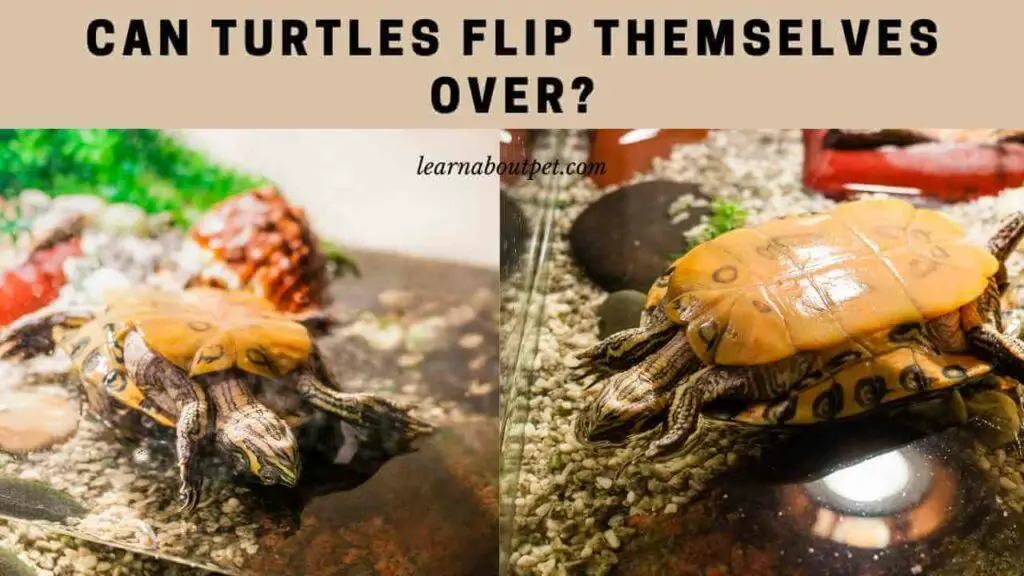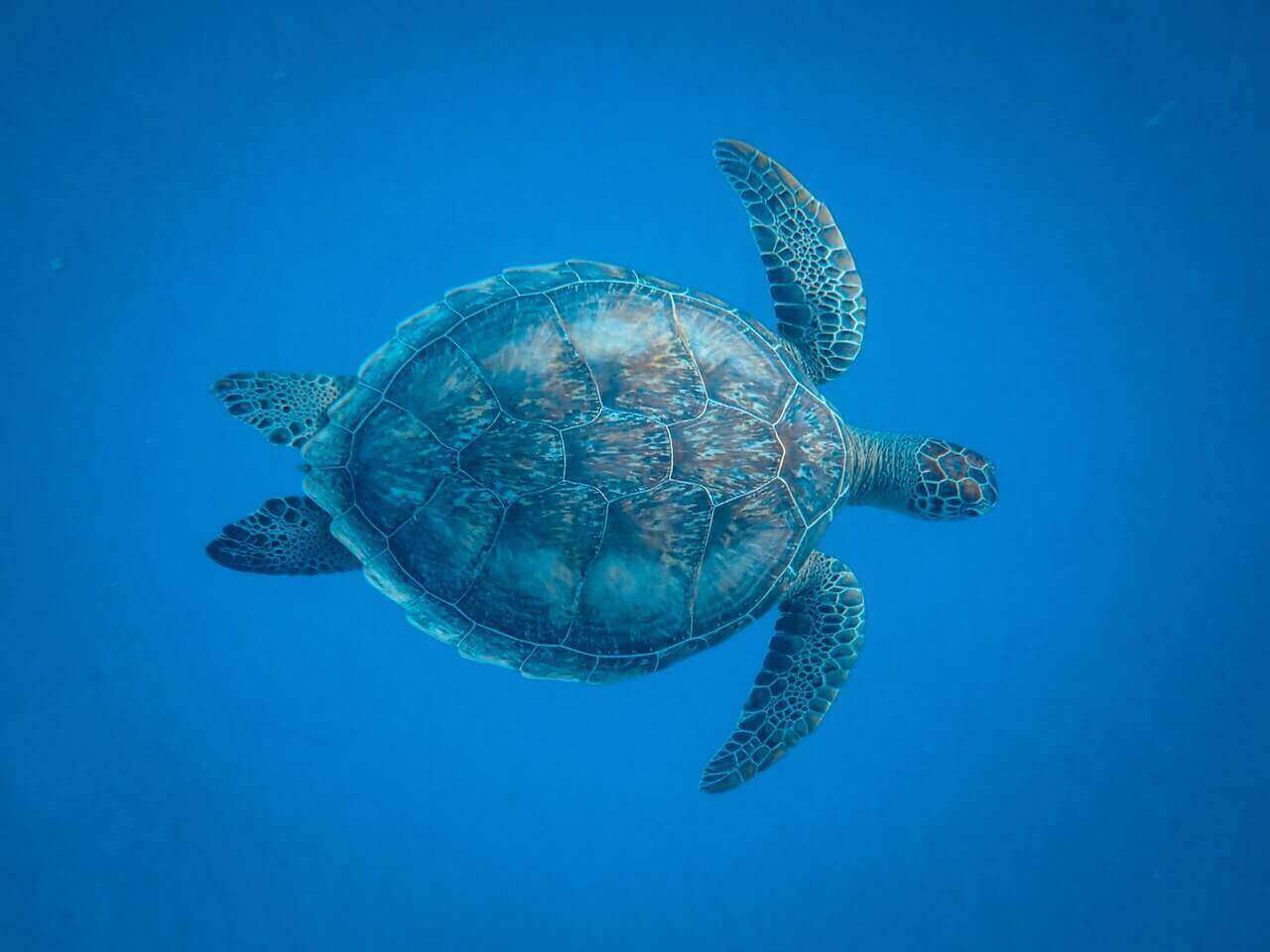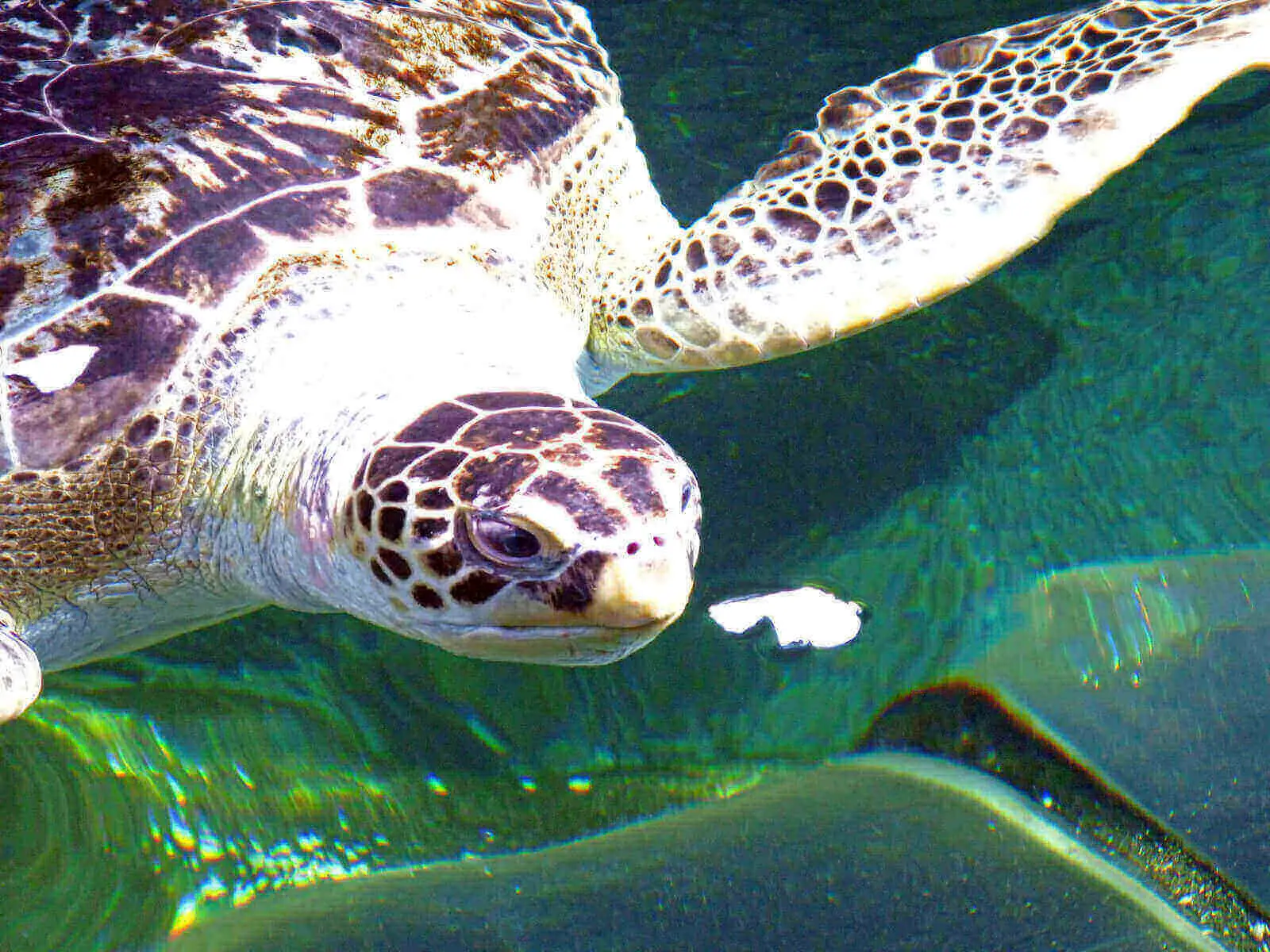One of the most frequently asked questions about turtles is as to whether they can flip themselves over. Usually, the person asking this question will be a turtle owner who happens to come across his precious pet in an upside down position. A turtle in an upside down position looks vulnerable and distressed. The sight of it can lead to questions like whether turtles can turn themselves over (or if it is a unique case), what causes them to flip over and how to help a flipped over turtle.
So, can turtles flip themselves over? The answer is yes. Turtles are capable of flipping themselves over. It can happen as they attempt to climb things. It can also happen due to poor aquarium setups. Turtles may also end up flipping themselves over while fighting or while fleeing from predators. There are also respiratory illnesses (typically associated with vitamin A deficiency) that can make turtles prone to flipping over.
A turtle that is flipped over is vulnerable. It is at risk of being dehydrated, especially if it is up against direct sunlight. The turtle is also unable to run away from its predators. And obviously, a turtle in the upside down position is unable to look for food.

Further, if the turtle is upside down in water, there is a risk of it drowning. Thankfully, most turtles are able to eventually get themselves back on their feet. If yours is completely unable to get right side up, you may give a helping hand.
Can Turtles Flip Themselves Over?
It is possible for turtles to flip themselves over. Therefore if you have found your turtle in upside down position, you need to understand that this is not something that is unique to him. It is something that happens to turtles often. Anyone who has kept pet turtles for a while will attest to having found them flipped over at one point or another. So it is something that happens.
A turtle in an upside down posture is, admittedly, a funny sight. One can barely hold back a laugh upon seeing a turtle flip camera photo (that is, a photo of a turtle that is flipped over). Heck, even a turtle flipped over GIF or turtle stuck on back meme can be very funny. But while such a turtle stuck on back GIF is funny (for us humans), it is still important to keep it in mind that any turtle in that position is under distress. For the turtles, it is not an especially nice position to find oneself in.
How Do Turtles Flip Over?
The can turtles flip themselves over question is usually followed by another one, on how exactly they manage to flip. So, how do turtles flip over? Well, there are several ways in which turtles flip over. One scenario is where, while attempting to climb on something, a turtle ends up flipping over.
Another scenario is where a turtle suffering from a respiratory illness (usually due to vitamin A deficiency) is unable to remain buoyant in water. So it keeps on flipping over. Yet another scenario is where a turtle fleeing from a predator ends up flipping over.
Another instance is where turtles flip over while fighting. This is common in males, who have a tendency to fight over females during the breeding season.
A turtle in an aquarium where the basking spot is set up at a sharp angle may flip over while trying to access it. Further, a turtle in a tank whose water is too shallow may flip over while trying to right itself. So there are many turtle flip possibilities.
Why Do Turtles Flip On Their Backs?
Sometimes, their natural clumsiness is the reason for turtles flipping on their backs. So you find a turtle attempting to climb something. But because of its lack of agility (clumsiness), it ends up flipping over.
Therefore if you have been wondering, can turtles flip themselves over while climbing, now you have an answer. It is a possibility, especially when we consider their lack of agility.
In other cases, turtles flip on their backs due to illness. For instance, if a turtle has a severe respiratory illness, which affects its mucous membranes, it may end up losing its buoyancy in water.
Consequently, when it is in water, it will keep on titling. This will cause it to keep on flipping over. Therefore if you have been wondering, why is my turtle flipping over time after time, now you have the possible answer.
There are also cases where turtles flip on their backs while fleeing from predators (or anything they perceive as a predator). For instance, if you keep a turtle, and you let it outside its tank, it encounters children or other pets that harass it, it may end up flipping over. Further still, in the course of fights, it is not uncommon for turtles to flip over.
Why Do Turtles Flip Each Other Over?
The can turtles flip themselves over question is typically followed by another one, on why turtles flip each other over. This follows the realization that besides flipping themselves over, turtles also keep on flipping each other over. So, why do turtles flip each other over? Turtles usually flip each other over as a fighting strategy.
As a matter of fact, turtle fights typically revolve around trying to flip each other over. This is because their armor (shell) makes it impossible for the normal fighting strategies of kicking, biting or scratching to be effective. Thus, the only way a turtle can ‘beat’ another one is typically by flipping it over.
Normally, it is the male turtles that will fight over females, during the breeding season. So the turtles fight by trying to flip each other over. Ultimately, the turtle that flies (in other words, flips over at high speed) after having been pushed by its rival is considered ‘defeated’.
With the defeated turtle stuck on his back, the winner can then proceed to enjoy the spoils of war: namely, the female that was being fought over.
Why Is My Turtle Flipping Over?
Many times, the question on can turtles flip themselves over comes from turtle owners who find their turtles flipping over. So the turtle owner wants to know: why is my turtle flipping over? And the answer is that the turtle may be flipping over because of a respiratory problem.
This is likely the case if the turtle keeps on flipping over, and has other symptoms of the condition (like discharges, bubbling in mouth and lack of appetite).
The turtle may also be flipping over because of the tank conditions. Like if the water is too shallow, the turtle may keep on falling over as he tries to right himself. Or if there is no basking spot in the tank, the turtle may keep on trying to climb out, and flipping in the process. Of course, if you keep two or more turtles, you may have one that keeps on flipping over due to fights.
What Happens When Turtles Flip Over?
In most cases, when turtles flip over, they will attempt to get back up. This they do by pivoting on their heads, necks and limbs to eventually get back up. So if you have been having the question on how do turtles flip back over, the answer is by pivoting.
So they pull the heads, necks and limbs on one side, creating a slight imbalance, which in turn forces them to fall back over – and thus regain their natural standing posture.
You may then ask, what happens when a turtle flips on its back and is unable to get up? In this case, the consequences can be dire. Such a turtle is prone to dehydration, which happens rather fast. The turtle stuck on back is also very vulnerable to predators.
Another fate that may befall turtles when they flip over is that of organ damage. In this case, as the turtle tries time and again to get back up, he may end up hurting his internal organs.
There is also the possibility of the turtle that flips over and is completely unable to get back up ending up starving or dying of thirst. These are real possibilities in the wild.
How easily a turtle gets back up will depend on factors like its health condition, shell shape, size and age. For instance, with regard to size, if you have a giant turtle flipped over, it will typically have a harder time getting back up than a smaller turtle.
On another note, a turtle with a dome shape shell will have an easier time getting back up than one with a flat shell. A younger, healthier turtle is also likely to have an easier time getting back up.

Can Turtles Flip Themselves Over In Water?
Yes, it is possible to find turtle flipped over water. It may happen, for instance, if the turtle has a respiratory illness that affects its mucous membranes, making it hard to maintain buoyancy. So the turtle keeps on tilting over in water.
In other words, the turtle flip flops in water (which by the way is a serious condition). Often this is as a result of vitamin A deficiency. With proper supply of vitamin A, the turtle may eventually stop flipping itself in water.
Another possibility is where the water in the turtle tank is too shallow. Therefore, as the turtle tries to right itself, it ends up flipping over. Another scenario is where there is no basking spot in the tank. So the turtle tries climbing out, to bask – in the process flipping over.
Further, if there are rocks or other decorations in the tank that the turtle can climb on, it will: and often end up flipping over.
So if you have been wondering, can turtle flip itself over in water, now you have the answer. It is definitely a possibility.
Can Box Turtles Flip Themselves Over?
As we said while answering the can turtles flip themselves over question, all types of turtles are capable of flipping themselves over. This includes the box turtles in question here. And when the do flip themselves over, box turtles tend to have a harder time getting back up. This is on account of their shorter limbs, which make it very hard for them to pivot and rise again.
Can Sea Turtles Flip Themselves Over?
Sea turtles are capable of flipping themselves over. Thankfully, where you have a sea turtle flipped over, it is likely to have an easier time getting back up. This is because a sea turtle typically has longer limbs. So it just pivots on those limbs, to get back up with relative ease. Indeed, while trying to learn how to play turtle flip game, watching the sea turtle get back up after flipping can be helpful. They do it with so much ease, compared to other types of turtles that have shorter limbs.
Can Snapping Turtles Flip Themselves Over?
It is possible for snapping turtles to flip themselves over. Sometimes, it happens when the snapping turtles are trying to climb things. At other times, it happens as the snapping turtles fight. There are also scenarios where snapping turtles suffering from respiratory illnesses that affect their mucous membranes lose their buoyancy. This makes them prone to tilting, and ultimately flipping over.
You may ask, can a snapping turtle flip itself over while fleeing from a predator? And the answer is ‘yes’, this is another possibility. Sometimes, while fleeing a predator, a snapping turtle runs so fast that it loses balance, and ends up flipping over. It may then go inside its shell, in a bid to reduce chances of harm from the predator in question.
How Long Can A Turtle Survive On Its Back?
The question on can turtles flip themselves over is typically followed by another one how long a turtle can survive on its back. So, indeed, how long can a turtle be on its back? Well, in some cases, a turtle on its back may die within hours, if it is unable to get the right way up. This may happen if it is under direct sunlight exposure, which causes dehydration.
Even without direct sunlight exposure, a turtle on its back that is unable to get the right way up is unlikely to last more than a few days (say one week max) before organ damage causes its death.
My Turtle Flipped Over – How To Help?
You may first want to give the turtle some time, to see if he is able to get himself back up. As we said earlier while answering the can turtles flip themselves over question, it is usually possible for them to eventually get back up on their own. If he is completely unable to get back up, gently flip him back to the upright condition.
Then try to investigate the reasons for his flipping over. Was he trying to climb something? Was he fleeing from something that he perceived as a predator? Is he suffering from a respiratory condition that is making him flip over? Or did he flip over as a result of a fight with another turtle (if you have more than one)?
Once you understand the reason behind your turtle flipping over, you can intervene. Where it is due to climbing, you may need to remove from his tank things that the turtle can flip over while attempting to climb. If it is due to predator flight, you may need to minimize his interactions with things that he may perceive as potential predators (including other pets and children). And where it is due to respiratory disease, you may need to have a vet check him.
Where the flipping over is due to tank/aquarium set up, you may need to improve on the same, to reduce incidents of the turtle flipping over.
Final Verdict – Can Turtles Flip Themselves Over
Can turtles flip themselves over? Turtles are capable of flipping themselves over. Sometimes, it happens when they attempt to climb things. At other times, it happens while fleeing from predators or in the course of turtle fights. There are also incidents where respiratory conditions cause turtles to lose buoyancy, leading to a tendency to tilt in water, and ultimately flip over.

In most cases, when a turtle flips over, it eventually manages to get back on its feet. How easily a turtle gets back on its feet depends on the length of its limbs, its shell shape, its size, its age and the state of its health. A turtle that is completely unable to get back up may experience severe distress and ultimately die. If your turtle keeps on flipping over time and again, it may be a good idea to have a vet check it.

Welcome to Learn About Pet. My name is Rajkumar Ravichandran and I love all pets, travel, and amazing food. I write about my passion and personal experience caring for multiple pets in this blog! ❤️
Post Disclaimer
DISCLAIMER: THIS BLOG OR WEBSITE, "Learn About Pet", DOES NOT PROVIDE YOU WITH MEDICAL ADVICE AND IS NOT A SUBSTITUTE FOR MEDICAL ADVICE. ALWAYS GET IN TOUCH WITH YOUR PERSONAL VETERINARIAN AND USE INFORMATION HERE AS GENERAL ADVICE.
The information, including but not limited to, text, graphics, images and other material contained on this website are for informational purposes only. No material on this site is intended to be a substitute for professional veterinary advice, food recommendation, diagnosis, or treatment. Always seek the advice of your veterinarian or other qualified health care provider with any questions you may have regarding a medical condition or for pet food related questions.







